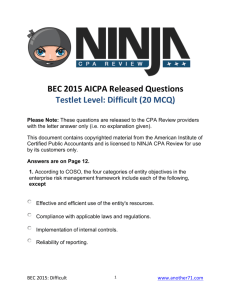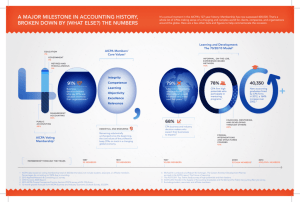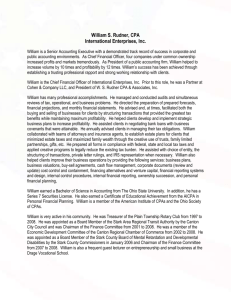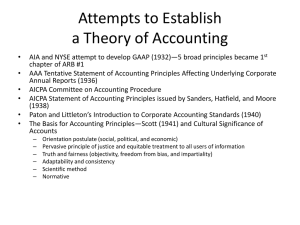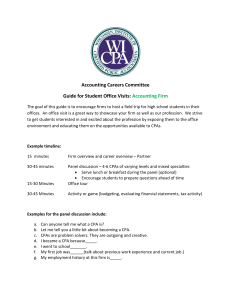File
advertisement
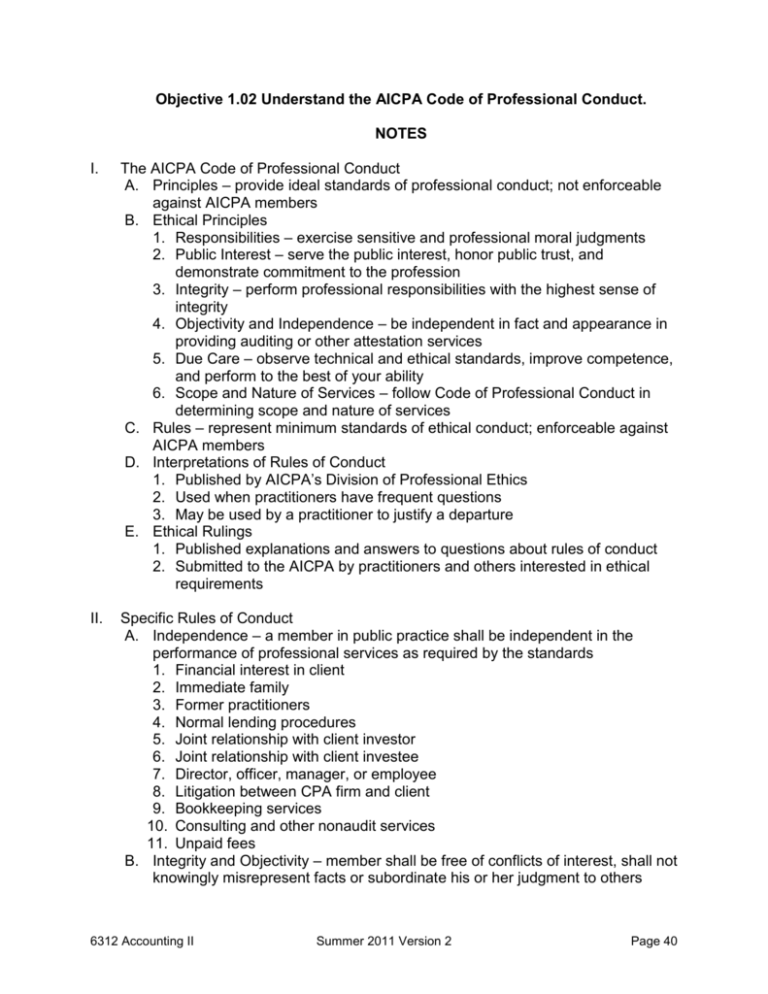
Objective 1.02 Understand the AICPA Code of Professional Conduct. NOTES I. The AICPA Code of Professional Conduct A. Principles – provide ideal standards of professional conduct; not enforceable against AICPA members B. Ethical Principles 1. Responsibilities – exercise sensitive and professional moral judgments 2. Public Interest – serve the public interest, honor public trust, and demonstrate commitment to the profession 3. Integrity – perform professional responsibilities with the highest sense of integrity 4. Objectivity and Independence – be independent in fact and appearance in providing auditing or other attestation services 5. Due Care – observe technical and ethical standards, improve competence, and perform to the best of your ability 6. Scope and Nature of Services – follow Code of Professional Conduct in determining scope and nature of services C. Rules – represent minimum standards of ethical conduct; enforceable against AICPA members D. Interpretations of Rules of Conduct 1. Published by AICPA’s Division of Professional Ethics 2. Used when practitioners have frequent questions 3. May be used by a practitioner to justify a departure E. Ethical Rulings 1. Published explanations and answers to questions about rules of conduct 2. Submitted to the AICPA by practitioners and others interested in ethical requirements II. Specific Rules of Conduct A. Independence – a member in public practice shall be independent in the performance of professional services as required by the standards 1. Financial interest in client 2. Immediate family 3. Former practitioners 4. Normal lending procedures 5. Joint relationship with client investor 6. Joint relationship with client investee 7. Director, officer, manager, or employee 8. Litigation between CPA firm and client 9. Bookkeeping services 10. Consulting and other nonaudit services 11. Unpaid fees B. Integrity and Objectivity – member shall be free of conflicts of interest, shall not knowingly misrepresent facts or subordinate his or her judgment to others 6312 Accounting II Summer 2011 Version 2 Page 40 C. General Standards – member shall comply with the following standards: 1. Professional competence – undertake only those professional services that can be completed with professional competence 2. Due professional care – exercise due professional care in the performance of professional services 3. Planning and supervision – adequately plan and supervise the performance of professional services 4. Sufficient relevant data – obtain sufficient, relevant data to provide a reasonable basis for conclusions and recommendations D. Compliance with Standards – must comply with the following standards: 1. Auditing Standards and PCAOB Standards 2. Statements on Accounting and Review Services 3. Statements on Standards for Attestation Engagements 4. Management Consulting Services Standards E. Accounting Principles 1. GAAP is considered to be any statement proclaimed by an authoritative body designated by the AICPA 2. CPAs must justify any departure from GAAP 3. Departure from GAAP is permitted IF following GAAP would make statements misleading F. Confidential Client Information – may not disclose any confidential client information without the specific consent of the client. Exceptions are: 1. Subpoenas or summons enforceable by a court order 2. Review of papers related to an ethics division inquiry 3. Review of papers related to a peer review 4. Obligations related to technical standards G. Contingent Fees 1. Fees to be determined upon a particular result 2. CPAs are forbidden to accept contingent fees for attestation services and tax return preparation H. Acts Discreditable 1. Retaining client records after they have been requested 2. Discrimination or harassment in employment practices 3. Noncompliance with standards 4. Negligence in the preparation of financial statements or reports 5. Solicitation or disclosure of CPA exam questions and answers 6. Failure to file a tax return or pay tax liability I. Advertising and other forms of solicitation – false, misleading, or deceptive advertising is prohibited. Examples of unacceptable advertising are: 1. Creates false or unjustified expectation of favorable results 2. Implies the ability to influence any court or similar body or official 3. Client is unaware that there is a likely chance that a stated fee will be substantially increased 4. Other representations that are likely to cause a reasonable person to misunderstand or be deceived. J. Commissions and Referral Fees – compensation paid for recommending a third party’s product or service to a client or recommending a client’s product or service to a third party. Prohibited if the firm also performs: 1. Audit or review of financial statement for the client 2. Compilation of financials in which lack of independence is not disclosed and the financials may be used by a third party 3. Examination of prospective financial information K. Form of Organization and Name 1. Member may practice public accounting only in a form of organization permitted by state law 2. CPA shall not practice public accounting under a firm name that is misleading 3. Ownership of CPA firms by non-CPAs is allowed under certain conditions 4. Firm may not designate itself as a member of the AICPA unless all CPA owners are members of the AICPA III. Enforcement of Policies – principally involves the following groups: A. State Boards of Accountancy – can revoke CPA certificate of license to practice B. AICPA Joint Trial Board – can suspend or expel members from the AICPA; less serious and unintentional violations will normally require only corrective and remedial action CONTENT I. Ethical Principles in the AICPA Code of Professional Conduct A. Responsibilities B. Public Interest C. Integrity D. Objectivity and Independence E. Due Care F. Scope and Nature of Services II. Specific Rules of Conduct A. Independence B. Integrity and Objectivity C. General Standards D. Compliance with Standards E. Accounting Principles F. Confidential Client Information G. Contingent Fees H. Acts Discreditable I. Advertising and Other Forms of Solicitation J. Commissions and Referral Fees K. Form of Organization and Name Ethical Principles Notes – exercise sensitive and professional 1. moral judgments – serve the public interest, honor public trust, and demonstrate commitment to the profession 3. – perform professional responsibilities with the highest sense of integrity 4. and – be independent in fact and appearance in providing auditing or other attestation services 5. – observe technical and ethical standards, improve competence, and perform to the best of your ability 6. and – follow Code of Professional Conduct in determining scope and nature of services 2. Specific Rules of Conduct Notes – A member in public practice shall be independent in the performance of professional services as required by the standards – Member shall be free of conflicts of interest, shall not knowingly misrepresent facts or subordinate his or her judgment to others General Standards – member shall comply with the following standards: Compliance with Standards – must comply with the following standards: Auditing Standards and PCAOB Standards Statements on Accounting and Review Services Statements on Standards for Attestation Engagements Management Consulting Services Standards GAAP is considered to be any statement proclaimed by an authoritative body designated by the AICPA; CPAs must justify any departure from GAAP; departure from GAAP is permitted IF following GAAP would make statements misleading Confidential Client Information – may not disclose any confidential client information without the specific consent of the client. Exceptions are: – Fees to be determined upon a particular result; CPAs are forbidden to accept contingent fees for attestation services and tax return preparation Specific Rules of Conduct Notes and other forms of solicitation – false, misleading or deceptive advertising are prohibited. Examples of unacceptable advertising are: Creates or unjustified expectation of favorable results Implies the ability to any court, or similar body or official Client is that there is a likely chance that a stated fee will be substantially increased Other representations that are likely to cause a reasonable person to misunderstand or be . Acts – Examples of discreditable acts are: and Fees – compensation paid for recommending a third party’s product or service to a client or recommending a client’s product or service to a third party. Prohibited if firm also performs: or review of financial statement for the client Compilation of financial statements in which lack of independence is not disclosed and the financials may be used by a third party Examination of prospective financial information Form of Organization and Name Member may practice public accounting only in a form of organization permitted by state law CPA shall not practice public accounting under a that is misleading of CPA firms by non-CPAs is allowed under certain conditions Firm may not designate itself as a member of the AICPA unless all are members of the AICPA Ethical Principles Graphic Organizer Specific Rules of Conduct Graphic Organizer Member in public practice shall be independent in the performance of professional services as required by the standards Member shall be free of conflicts of interest, shall not knowingly misrepresent facts or subordinate his or her judgment to others _____________________ ______________________ Member shall comply with the following standards: Professional Due professional Planning and Sufficient relevant __________________________ Must comply with the following standards: Auditing Standards and PCAOB Standards Statements on Accounting and Review Services Statements on Standards for Attestation Engagements Management Consulting Services Standards _________________________ Specific Rules of Conduct Graphic Organizer GAAP is considered to be any statement proclaimed by an authoritative body designated by the AICPA CPAs must justify any departure from GAAP Departure from GAAP is permitted IF following GAAP would make statements misleading __________________________ May not disclose any confidential client information without the specific consent of the client. Exceptions are: Subpoenas or summons enforceable by a court order Review of papers related to an ethics division inquiry Review of papers related to a peer review Obligations related to technical standards _________________________ Fees to be determined upon a particular result CPAs are forbidden to accept contingent fees for attestation services and tax return preparation _________________________ Retaining client records after they have been requested Discrimination or harassment in employment practices Noncompliance with standards Negligence in the preparation of financial statements or reports Solicitation or disclosure of CPA exam questions and answers Failure to file a tax return or pay tax liability __________________________________ Specific Rules of Conduct Graphic Organizer False, misleading or deceptive advertising are prohibited. ______________________ Compensation paid for recommending a third party’s product or service to a client or recommending a client’s product or service to a third party. _____________________ Member may practice public accounting only in a form of organization permitted by state law CPA shall not practice public accounting under a firm name that is misleading Ownership of CPA firms by non-CPAs is allowed under certain conditions Firm may not designate itself as a member of the AICPA unless all CPA owners are members of the AICPA _________________________________ Review Activity Using PowerPoint, create a scenario showing ethical behavior and a scenario showing unethical behavior for each of the specific rules of conduct. Use appropriate clip art to enhance slides where possible. Specific Rules of Conduct Independence Integrity and Objectivity General Standards Compliance with Standards Accounting Principles Confidential Client Information Contingent Fees Acts Discreditable Advertising and Other Forms of Solicitation Commissions and Referral Fees Form of Organization and Name Sample Test Questions 1. Jones CPA Firm received a request from AAA Credit for copies of Amy Johnson’s federal tax return. Jones CPA Firm sent a copy of the tax return to AAA Credit without asking Ms. Johnson. Which specific rule of conduct is Jones CPA Firm violating? A. B. C. D. Acts discreditable Confidential client information Contingent fees Independence 2. Nancy Smith, CPA has only prepared financial reports in her business. She has been asked to prepare a federal tax return for Michael Brown. Smith refuses to accept the engagement based on her experiences. Which general standard is being followed? A. B. C. D. 3. Betty’s Bookkeeping Service posted a sign that stated “Members of the AICPA”. The owner, Betty Wilson, has studied to take the CPA exam but has not yet taken it. Which specific rule of conduct did Betty’s Bookkeeping violate? A. B. C. D. 4. Advertising and other forms of solicitation Commissions and referral fees Contingent fees Form of organization and name Samuel is a CPA whose sister, Janet, is a Sales Representative for EZ Accounting Software. Samuel recommends EZ Accounting Software to all his audit clients. Janet pays Samuel 5% of the sale every time one of the clients purchases the software. Which specific rule of conduct is being violated? A. B. C. D. 5. Due professional care Planning and supervision Professional competence Sufficient relevant data Advertising and other forms of solicitation Commission and referral fees Confidential client information Independence Jonathan Smith, Inc., a CPA firm, prepares the audit for Mom’s Diner. Mom’s Diner is owned by Jonathan’s aunt. Which specific rule of conduct is Jonathan Smith, Inc. violating? A. B. C. D. Confidential client information Contingent fees Independence Integrity and objectivity 6. Mary Baker, CPA, is preparing financial statements for The Brookline Company. Mary determines that certain GAAP requirements would be too costly for The Brookline Company. Mary prepares the statements but does not tell the client about not following the GAAP requirements. Which specific rule of conduct did Mary violate? A. B. C. D. Accounting principles Advertising and other forms of solicitation Confidential client information Contingent fees

